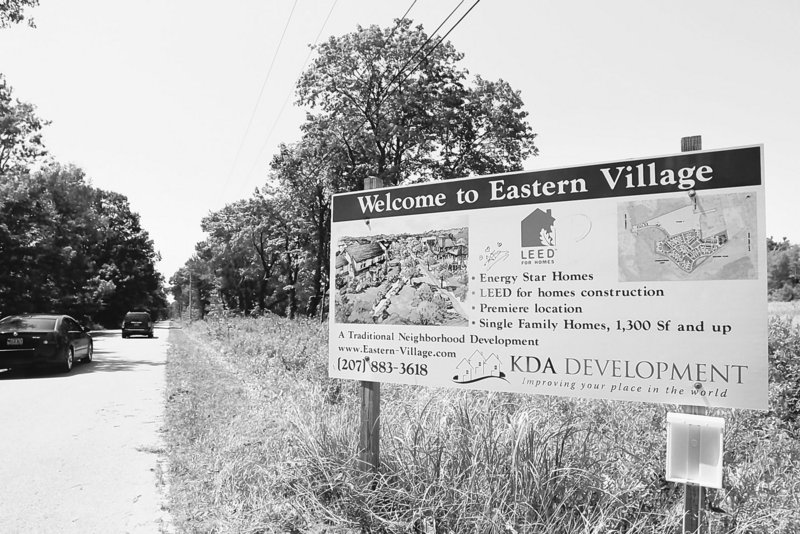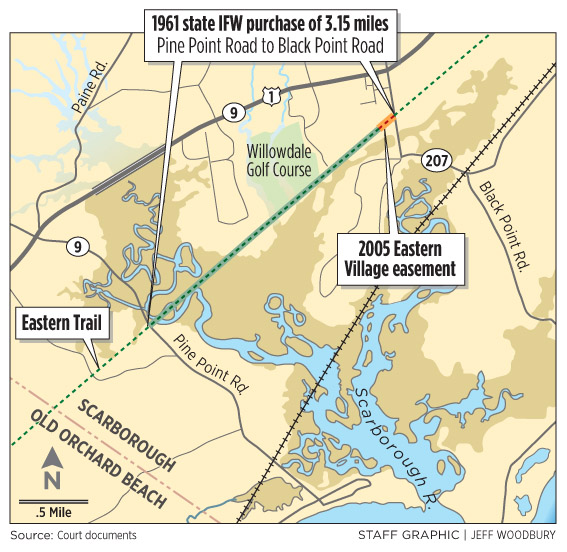SCARBOROUGH – A group of town residents has gone to court to challenge an easement granted to a housing development along the Eastern Trail.
Scarborough Citizens Protecting Resources and three of its members are suing over an easement the state Department of Inland Fisheries and Wildlife granted to the developer of the 152-unit Eastern Village subdivision in 2005.
IFW’s easement allows Ballantyne Development LLC to use a 766-foot section of the trail as an access road to link the project with Black Point Road. The easement allows Ballantyne to build a street and sidewalks over that section of the trail, which is already paved and is known as Eastern Road.
The developer is required to reconstruct a portion of the trail on Ballantyne’s property.
The easement for Eastern Village falls within a 3.15-mile stretch of the trail that IFW bought using federal wildlife funds that came with a number of conditions. IFW failed to satisfy those federal requirements, as well as some state provisions, when it granted the easement, according to the complaint filed in U.S. District Court last week.
The Eastern Trail is a former railroad corridor that could eventually connect South Portland and Kittery and ultimately serve as a link in the East Coast Greenway between Calais and Key West, Fla. In Scarborough, the Eastern Road portion of the trail runs along a field where a later phase of Eastern Village would be built. The trail then passes a Scarborough Sanitary District pump station and a private home before turning to gravel.
Kerry Anderson, the developer who formed Ballantyne to build Eastern Village, has access options other than the Eastern Trail, said Steve Hinchman, the plaintiffs’ lawyer. There is access off Commerce Drive, where a private road already leads to an existing portion of Eastern Village, and there could also be access from Ward Street, Hinchman said.
“He can have his development. He doesn’t have to destroy the Eastern Trail to have his project,” Hinchman said.
Anderson said Monday that Black Point Road access was important to the project. He said he did not yet know how the loss of that access would affect the development.
“I hadn’t really thought about it,” he said. “Until now, we’d been all set. I’d have to consider the implications.”
The state’s 1961 purchase of the Eastern Trail section — about 32 acres for $6,000 — used funds from the federal Pittman-Robertson Wildlife Restoration Grant Program. Restrictions attached to the funds include getting approval from the regional U.S. Fish and Wildlife Service before conveying or encumbering property, and either replacing property or reimbursing the federal agency at current full market value if the state agency loses management control, the complaint said.
The complaint said that because this portion of the Eastern Trail is part of a Maine wildlife management area, it is also subject to a number of state conditions. Those include giving the governor authority to sell or convey the property when it is no longer needed, and requiring a two-thirds vote of the Legislature when the land’s size is reduced or its uses changed.
The complaint asserts that the Eastern Village easement failed to meet those requirements. It also says eight other easements the state fish and wildlife agency granted along the same section of the trail between 1968 and 2002 did not meet all the necessary conditions.
The plaintiffs are asking the court to invalidate the Eastern Village easement and order the agency to replace land or reimburse for the other easements, which include those to the town for sewer and utilities and to a property owner for access to his land.
In addition to IFW Commissioner Roland Martin, the lawsuit names as defendants Department of Environmental Protection Commissioner David Littell, Gov. John Baldacci and Marvin Moriarty, the regional director of the U.S. Fish and Wildlife Service.
The state agencies, along with the governor’s office, directed requests for comment to the state Attorney General’s Office. Spokeswoman Kate Simmons said the office does not comment on pending litigation. A spokeswoman for the regional U.S. Fish and Wildlife Service also said there would be no comment on pending litigation.
Susan DeWitt Wilder, one of the three individual plaintiffs in the suit, was part of a group pushing for the revocation of Eastern Village’s stormwater license, said research on that issue led to the discovery of the problems around the easement.
“We hope it draws attention to the places where these easements may have been given inappropriately,” said Wilder, a former board member of the Friends of Scarborough Marsh.
Staff Writer Ann S. Kim can be contacted at 791-6383 or at: akim@pressherald.com
Send questions/comments to the editors.



